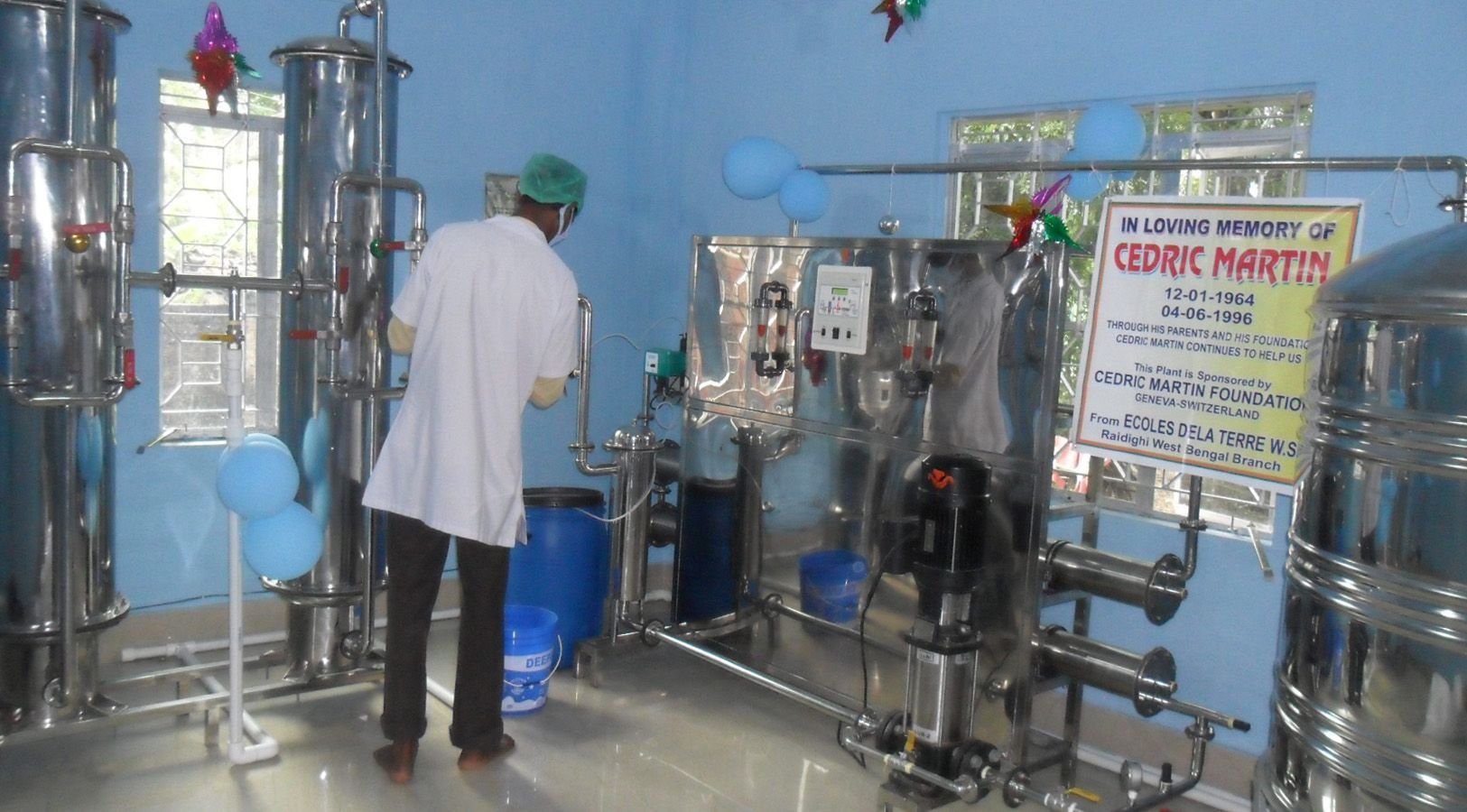HEALTH, HYGIENE AND WATER
ASSOCIATION ECOLES DE LA TERRE AND CEDRIC MARTIN FOUNDATION ARE IN PARTNERSHIP FOR THE CREATION OF A SCHOOL OF WATER

WATER SCHOOL

Our goal...
SAFE DRINKING WATER
If you are interested in training for a future job and working in our Organization …
① We offer motivated and ambitious people to integrate perfectly into an existing working group. They will have to speak and understand French. They will be able to train and perfect their knowledge in recognized processes for the treatment of drinking water.
We are concerned about water in general but mainly about drinking water, potable water and the various treatment and production processes. But we are also interested in the possible use of waste water for cleaning, washing and watering.
② We offer the possibility to interested persons to follow :
- Technical training in mechanics and electricity. The study and application of the process we have chosen for the production of drinking water, in 20 litre jars or in large quantities. We want to insure the proper operation and maintenance of our equipment. We want to guarantee quality control of the drinking water produced and delivered.
- Commercial training to ensure the marketing and distribution of our drinking water production. We want to guarantee the control of production costs in order to give access to water to the most deprived. We wish to study and develop the network ofdepositaries and consumers as well as to ensure the organization of production and logistics.
③ We offer the opportunity for enterprising people to make a long-term commitment to the management of an autonomous and sustainable water production unit.
You fulfil the conditions and you are interested, then please contact:
By phone for English and Hindi/Bengali at +9187 689 68920 (with WhatsApp)
By phone for the French language: +4179 441 0675 (with WhatsApp)
By email at: ecolesdelaterre.welfaresociety@yahoo.in

In addition to education, our aid and support programmes also cover hygiene and health, given the poverty that prevails among those with whom Ecoles de la Terre works. Environmental damage and poverty have contributed over time to the cause and spread of disease in rural areas of the Sundarbans Islands, Bihar and the Thar Desert, and the slums of Calcutta and Delhi.
In many villages and poor urban neighbourhoods, living conditions are difficult, unhealthy and unsanitary. The poor quality of water and food and the low level of hygiene largely explain this dismal situation. The extreme poverty experienced by most families forces them to store food unsafely and for too long, so it becomes spoilt and loses its nutritional value.
The health of children is more often than not a cause for concern, with Ecoles de la Terre having to act quickly in some cases. The most common diseases observed are skin disorders, eczema, boils, lung infections, tuberculosis, lip and eye infections, intestinal problems, gastroenteritis, diarrhoea and dysentery. Children are the first to suffer from these diseases. Polio, malaria, meningitis, leishmaniasis, scabies, filariasis, leprosy, typhoid fever, hepatitis A, cholera and chronic diarrhoea also occur and can cause other disorders.
Poor sanitation must of course be fought as a matter of priority. Basic hygiene codes and rules should be revised and need to be introduced into schools. Access to proper sanitary facilities is a major issue and a public health challenge.
Urban and rural differences
In the slums and poor neighbourhoods of major cities, hygiene conditions are poor and often dire. In the slums, the demeaning overcrowding and cramped conditions make life uncomfortable and unsanitary. During heavy rains, floods and landslides frequently occur due to the lack of drainage facilities. Sanitation services, access to drinking water, toilets and electricity are all too often non-existent or defective. The lack of proper waste management increases the risk of disease. Widespread pollution compounds the problem of malnutrition. Compliance with hygiene standards is almost impossible to enforce. Slum dwellers attend hospital only in extreme circumstances. They tend to choose overcrowded and overstaffed state hospitals lacking sufficient resources. due to the cost: with no health insurance, they know they cannot spend money on healthcare.
Despite sustained growth as measured by economic indicators, India remains predominantly rural and poor. The exploding population affects primarily major Indian cities, even though three quarters of the population still lives in rural areas. While hygiene in general and access to drinking water pose roughly as great a challenge as in the metropolises, it is important to be aware of the subtle differences between the contrasting cultures of villages and cities. India has one hospital bed for more than 2,000 people. This statistic is hardly applicable to remote rural areas where a hospital stay is unimaginable for many of its inhabitants. The difference between the care offered to the rich and that which the poor can afford is staggering. Almost 90% of the rural population has no health insurance.
India's health system is one of the world's most unequal. Only money guarantees access to health services. Consequently, an astonishingly high number of Indians do not have access to even the most basic healthcare, although the central Indian government is trying to set up a medical programme to exempt the poorest individuals from medical costs in some public institutions. As public hospitals are overcrowded and lacking in resources, this medical response programme cannot be extended nationwide.
Our health programme
Amid this medical-social crisis, we have sought to bridge the vast healthcare gap by organising travelling health clinics where doctors and nurses visit pupils at our schools in Bengal, Bihar and Rajasthanon. We have been doing this since our first school programmes were introduced at the end of the 1990s
During the first visit of the school year, doctors and nurses carry out health check-ups at each school. Following the first medical consultation and in the light of the results, all subsequent visits are given over to the care and treatment of the pupils concerned.
Despite difficult and austere working conditions due to the lack of funds and the geographical distance from schools, check-ups are carried out regularly and appropriate treatment is provided. After all these years of work, we have observed that the pupils' general health has tended to improve significantly over time.
In 2007, we built a rural health clinic in Bihar State for the inhabitants of about 30 villages. More than 1,000 pupils and apprentices are monitored in this clinic. The medical team administers about 30,000 treatments per year. For a small registration fee, residents of these villages now benefit from free healthcare. Accompanied by an assistant, a doctor also visits the more remote schools on a regular basis.
We would like to replicate this model in other Ecole de la Terre schools in India, but insufficient funds have prevented us from achieving our goal. We continue to provide medical consultations as part of our travelling health units at a rate of four visits per month.
However, the improvement in the general health of pupils and their families can also be attributed to a water purification programme established in the past decade.
Our water programme
As water hygiene is vital for health, we have taken action in this area given that waterborne diseases represent some 80% to 90% of the treatments provided to children and their families.
Contagious viruses, bacteria, parasites, plant and animal microorganisms, water and as a consequence food spread these diseases already mentioned above. This is a good opportunity to recall Louis Pasteur's statement that 'we drink 90% of our diseases'.
Not everyone has access to safe drinking water, particularly the most disadvantaged. Given that access is so difficult, rural populations struggle to regulate consumption for agricultural and domestic purposes. That is why Ecoles de la Terre has built well water purification and drinking water production plants to eliminate many of these diseases that come from impure or contaminated water sources.
Six well water purification plants and two drinking water production plants have been built in the West Bengal Sundarbans Islands to date, while three water purification plants are also in operation in Bihar's Gaya district. We now intend to install a special purification system for tank water in the Thar desert. Each of our schools is equipped with a large capacity water tank.
We want to combine our efforts for the benefit of those most in need. Our 'Health, Hygiene and Water' programme has an educational dimension and illustrates the interdependence of an interconnected and dynamic social project. Going even further, the same applies to our micro-credit economic support programme. All our programmes are closely linked.


